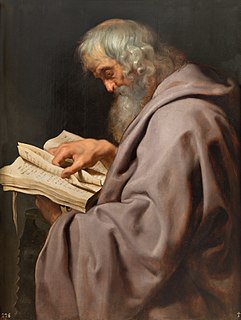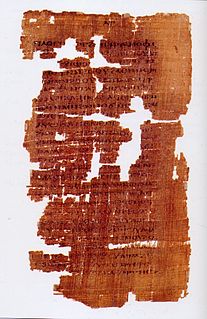This page is based on this
Wikipedia article Text is available under the
CC BY-SA 4.0 license; additional terms may apply.
Images, videos and audio are available under their respective licenses.

Matthias was, according to the Acts of the Apostles, the apostle chosen to replace Judas Iscariot following Judas' betrayal of Jesus and his (Judas') subsequent death. His calling as an apostle is unique, in that his appointment was not made personally by Jesus, who had already ascended into heaven, and it was also made before the descent of the Holy Spirit upon the early Church.
Judas Iscariot, the apostle of Jesus who betrayed him.

Judas Iscariot (; Biblical Hebrew: יהודה, translit. Yehûdâh, lit. 'God is praised'; Greek: Ὶούδας Ὶσκαριώτης) was a disciple and one of the original Twelve Disciples of Jesus Christ. According to all four canonical gospels, Judas betrayed Jesus to the Sanhedrin in the Garden of Gethsemane by kissing him and addressing him as "Rabbi" to reveal his identity to the crowd who had come to arrest him. His name is often used synonymously with betrayal or treason. Judas's epithet Iscariot most likely means he came from the village of Kerioth, but this explanation is not universally accepted and many other possibilities have been suggested.

The Last Temptation of Christ or The Last Temptation is a historical novel written by Nikos Kazantzakis, first published in 1955. It was first published in English in 1960. The Holy Synod of the Greek Orthodox Church in Athens wanted this book banned in Greece stating:
This novel, which is derived from the inspiration of the theories of Freud and historical materialism, perverts and hurts the Gospel discernment and the God-man figure of our Lord Jesus Christ in a way coarse, vulgar, and blasphemous.

Simon the Zealot or Simon the Cananite or Simon the Cananaean was one of the most obscure among the apostles of Jesus. A few pseudepigraphical writings were connected to him, and the theologian and Doctor of the Church, Saint Jerome, does not include him in De viris illustribus written between 392–393 AD.

Barabbas is a figure mentioned in the New Testament of the Bible, in which he is an insurrectionary held by the Roman governor at the same time as Jesus, and whom Pontius Pilate freed at the Passover feast in Jerusalem, while keeping Jesus as a prisoner.
The Judas Testament is a 1994 novel by Daniel Easterman. The plot revolved around the discovery of an epistle in Moscow by a scholar of the Aramaic language, who becomes the unwitting pawn in a murderous struggle by various crypto-political forces to possess the scroll.
The Book of Thomas the Contender, also known more simply as the Book of Thomas, is one of the books of the New Testament apocrypha represented in the Nag Hammadi library, a cache of Gnostic gospels secreted in the Egyptian desert. The title derives from the first line of text.

The Gospel of Matthias is a lost text from the New Testament apocrypha, ascribed to Matthias, the apostle chosen by lots to replace Judas Iscariot. The content has been surmised from various descriptions of it in ancient works by church fathers. There is too little evidence to decide whether a Traditions of Matthias is the same work, according to J.B. Matthews, The Anchor Bible Dictionary (IV:644).
The Codex Tchacos is an ancient Egyptian Coptic papyrus, which contains early Christian gnostic texts from approximately 300 AD: the Letter of Peter to Philip, the First Apocalypse of James, the Gospel of Judas, and a fragment of the Book of Allogenes.

Rodolphe Kasser, philologist and archaeologist, was a Coptic scholar and Swiss national. He was an expert in translation of ancient Coptic language manuscripts.

The arrest of Jesus was a pivotal event in Christianity recorded in the canonical gospels. Jesus, a preacher whom Christians consider to be the Son of God, was arrested by the Temple guards of the Sanhedrin in the Garden of Gethsemane. It occurred shortly after the Last Supper, and immediately after the kiss of Judas, which is traditionally said to have been an act of betrayal since Judas made a deal with the chief priests to arrest Jesus. The event ultimately led, in the Gospel accounts, to Jesus' crucifixion.

The kiss of Judas, also known as the Betrayal of Christ, is how Judas identified Jesus to the multitude with swords and clubs who had come from the chief priests and elders of the people to arrest him, according to the Synoptic Gospels. The kiss is given by Judas in the Garden of Gethsemane after the Last Supper and leads directly to the arrest of Jesus by the police force of the Sanhedrin.

Simon Mawer is a British author who lives in Italy.
The term Bible fiction refers to works of fiction which use characters, settings and events taken from the Bible. The degree of fictionalization in these works varies and, although they are often written by Christians or Jews, this is not always the case.

The commissioning of the Twelve Apostles is an episode in the ministry of Jesus that appears in all three Synoptic Gospels: Matthew 10:1–4, Mark 3:13–19 and Luke 6:12–16. It relates the initial selection of the Twelve Apostles among the disciples of Jesus.

The Bargain of Judas is a biblical episode related to the life of Jesus which is recorded in all three Synoptic Gospels, Matthew 26:14–16, Mark 14:10–11 and Luke 22:1–6. It relates how Judas Iscariot made a bargain with the Jewish chief priests to betray Jesus.

In Christian theology and ecclesiology, the apostles, particularly the Twelve Apostles, were the primary disciples of Jesus. During the life and ministry of Jesus in the 1st century AD, the apostles were his closest followers and became the primary teachers of the gospel message of Jesus.













